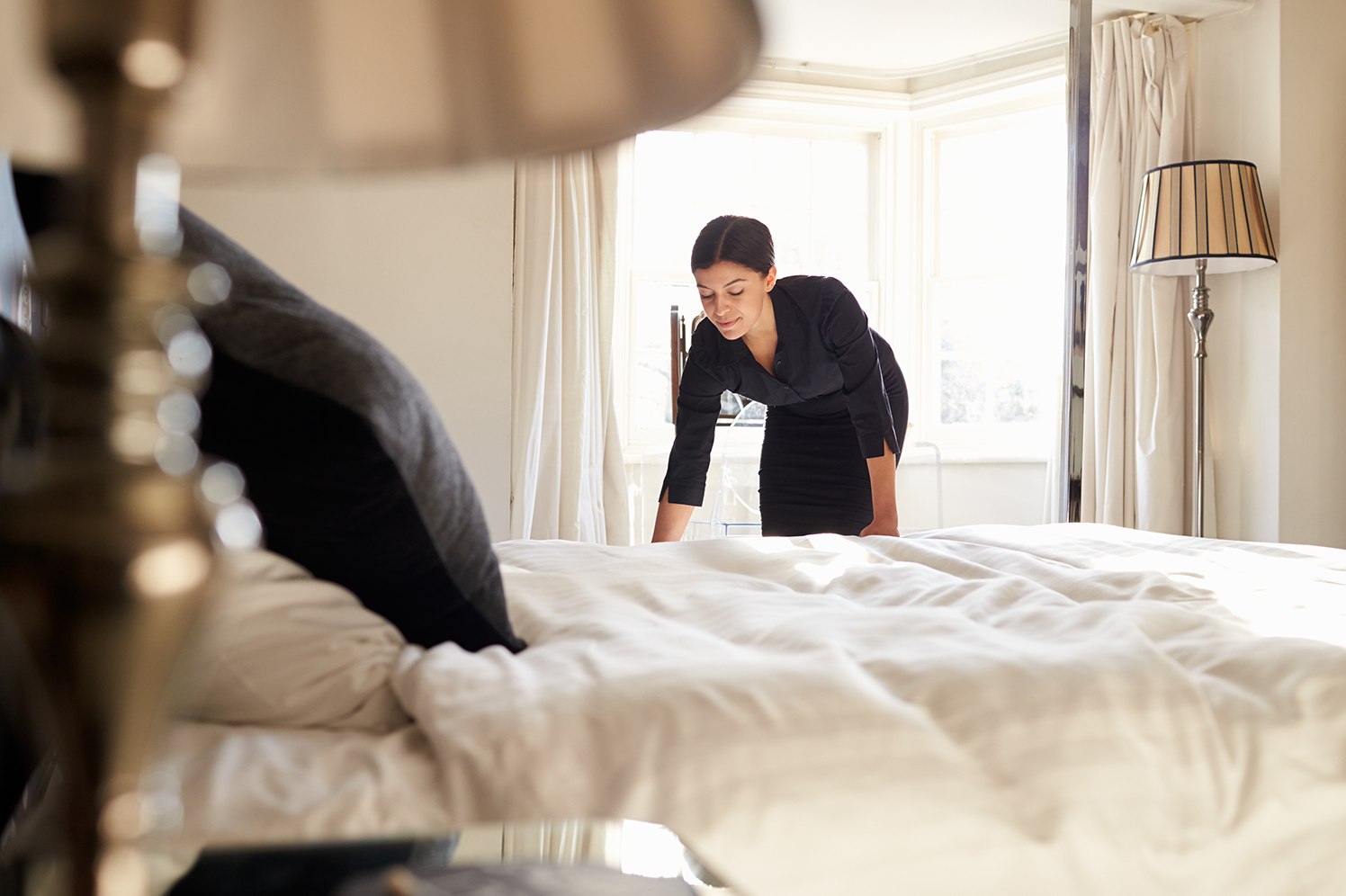Table of contents
An overview of the cleaning industry
Legal considerations when you start a cleaning business
The cost of starting a cleaning business
Becoming profitable in the cleaning industry
How to take payments
Winning contracts and establishing customer loyalty
Intro
If you’re wondering how to start a cleaning business, you’re in the right place. This guide covers everything from legal considerations to how to accept bookings and take payments. You’ll be ready to set up your cleaning business in no time.

Deep Dive
An overview of the cleaning industry
The cleaning industry can be divided into two main categories: Consumer/domestic cleaning services and commercial cleaning services. Domestic cleaners specialise in residential properties (homes), while commercial cleaners serve businesses and public buildings.
Both consumer and commercial cleaning offer a variety of services that can be further broken down into the following sub-categories:
-
Janitorial cleaning, ‘caretaker’ or general housekeeping cleaning refers to the general maintenance of a specific property. Janitorial cleaning businesses may have an array of their own equipment, spanning potentially from vacuums to bathroom equipment. In some cases, they may use equipment provided by the customer. They usually charge by the hour.
-
Specialist cleaning services such as carpet cleaning and oven cleaning. These businesses usually charge based on the specific project and the cleaning products and materials needed to effectively clean a floor space or oven.
-
Window cleaning is another specialised service that focuses on window treatments of buildings, and can be charged based on the size or number of windows.
When you are first starting a cleaning business, decide on a niche service that falls into one of these categories. This can help you better define your goals and price your services correctly.
Legal considerations when you set up a cleaning business
Depending on where you start a cleaning business, there are a few legal considerations and registration requirements to explore.
All business owners are required to register their business. You may also want to enrol in courses which will grant you a professional qualification upon completion. Cleaning products and processes can be dangerous so you may wish or need to consider training around health and safety, the handling of hazardous substances and infection control. If you or your employees will be working solo, extra training on lone working may also be useful.
Another thing to think about: When you or your staff enter a client’s home or office, your cleaning business becomes responsible for their belongings. Insurance coverage can protect you from unforeseen damages and financial loss that may occur while on the job. Here are a few insurance options to consider:
-
Public liability insurance covers accidental damage that can occur on a customer’s property.
-
Company car insurance if you give your employees a company vehicle for travel between clients
Of course, as with all of our guides, this is for informational purposes only; you should consult an experienced legal expert to meet your specific small business needs.

The cost of starting a cleaning business
Due to the variability of jobs in the industry, the cost to start a cleaning business depends on several factors, including equipment, location, transportation and employees.
-
Equipment
The cost of your equipment includes the cleaning supplies needed to complete a particular job as well as the tools for the services offered. For example, businesses that specialise in window cleaning services need to purchase soap and gloss for the windows as well as water buckets, scrapers and sponges.Equipment like this can get expensive (depending on how often you’re working), so it’s important to research wholesalers that sell items in bulk. When you order equipment and cleaning supplies in bulk, you are typically spending less per unit and purchasing less often (which cuts down on any delivery costs).
-
Location
Many cleaning businesses start out from a home-based office. Renting an office or unit can be a major expense for a small business that significantly affects your bottom line. A home office can help lessen those costs. However, your home office needs to have the storage space to accommodate all of your equipment and cleaning supplies. It’s a good idea to notify your house insurance provider if you start working from home or keeping a stock of expensive cleaning products or equipment there. You will need to ensure you are fully covered.Some cleaning businesses need a commercial facility in order to successfully run their day-to-day operations. A commercial facility helps your business create a professional image, but you must carefully assess how much space you actually need so you don’t overspend. Be sure to think about how much room is needed for a reception area, storage room, laundry room and break room for your employees.
-
Transportation
Because cleaning services are provided on a client site, transportation costs should be included in the cost of starting a cleaning business. The cost of a vehicle, petrol used and routine maintenance are all cost factors to consider. -
Employees
Initial staffing needs largely depend on the capital you have when you first start your cleaning business and the volume of customers you are targeting. Some owners start out solo and complete all service requests alone.As your company grows, you may consider hiring additional employees, but that comes at a cost. In addition to providing salary and benefits, you need to consider the cost of tools to help you manage your team — like team management software that tracks employee hours.
Becoming profitable in the cleaning industry
You’re going to need to work out a pricing strategy that keeps your prices competitive whilst allowing you to cover costs and make a profit. Getting to grips with your target market will be a major help with this.
Create a business forecast to calculate your break-even point (where revenue/income equals profit). Forecasting helps cleaning businesses understand their cash flow, adjust operations and predict how many jobs they need to be taking each week in order to become profitable.
Taking bookings
To begin taking bookings you’ll first need to ensure people know your business exists and what you offer. One of the easiest and cheapest ways to do this is to create an online presence.
Take your cleaning business online
You can set up a business Facebook page in a few clicks and create a business website too. With Square, you can design your own website even if you have limited technical skills.
Online bookings
Running a calendar and keeping track of appointments is usually one of the most vital administration tasks for a cleaning business. You’ll likely have lots of clients. Depending on the nature of your service, you may have some clients to book in on a regular basis, perhaps weekly or biweekly. There may also be one-off customers.
To keep track of your appointments and offer ultimate convenience to your customers take the calendar online and allow people to book directly to suit them. You can do this for free and can keep track of everything in one place for you and any staff you have too. Any cancellations will show up immediately and allow you to book the time out again preventing wasted hours and missed income.
Integrate your calendar into your website and you can take payments online too making the whole transaction seamless for you and your customers.
How to take payments
You’ve determined how much to budget for your cleaning business and created a profitable pricing plan. Now it’s time to think about how to take payments and bill your customers.
Cash use has declined in the UK and people [value being able to pay for services via direct transfers, online and with a card. Creating convenience in terms of payment for your cleaning service customers can be another selling point for your business. You can equip yourself to take card payments with an investment of £19 in a simple portable card reader that links to a free app on your phone.
With an integrated EPOS platform, you can easily manage all forms of payments as well as other processing functions for your cleaning business. Many professional cleaning services use invoices to bill customers for their services

Winning contracts and establishing customer loyalty
With all of the operations set up, many new business owners wonder how to get cleaning contracts with new customers and establish a customer base that keeps their business afloat.
The first step is to develop your brand. Writing a business plan is a good idea to help you think through exactly how you are going to make money and where the opportunities to find customers are.
You want to pinpoint your competitive advantage, whether it be pricing, speed or customer service. Then ensure you deliver on it.
You may find your first customers by approaching them directly. If you are offering cleaning in people’s homes that could be via a direct doorstep conversation or with leaflets. Ensure you consider the rules on door-to-door sales and take measures to not be a nuisance to people. If your service is commercial cleaning, you may consider getting in touch with businesses by email first.
Businesses benefit from an online presence where people can find out more about you and your services. Reviews can really help to promote your business to new customers so register with Google My Business and have a social media account. Small businesses can benefit in a big way from being on social media too.
An online presence is also a way for new customers to find your business. Your website and social media accounts can be discovered when people search for your service in a search engine like Google. Social media is a powerful tool for growth for small businesses.
Considering and creating loyalty schemes to encourage repeat business is a great idea. Can you offer a discount voucher for a second booking? Perhaps a reduced rate for booking a number of cleaning sessions in one go?
Marketing your cleaning business
To reach new customers when you start your cleaning business and once you’re up and running, you’ll want to think of a marketing plan.
Hopefully, you’ll have begun to consider this when you created your business plan.
Marketing means everything you are going to do to communicate your brand and what you have to offer to a wide audience.
It includes your website, social media, paid-for-advertising (online and in print), leaflets, posters, PR efforts – your attempts to get positive coverage in the media and being visible on review sites like Trustpilot and Trustatrader.
Develop messaging that showcases your unique selling points and communicate it through every touchpoint of your cleaning company.
To determine the right marketing mix — and the best marketing channels to use — it’s important to identify who your customers are and figure out where they are most likely to find your marketing (e.g. local media, online, social media.
Related Articles
How To Start A Business
How to Create an Invoice — 3 Easy Ways
Four Essential Steps to Get Cleaning Contracts
